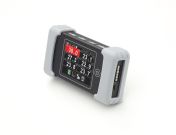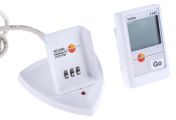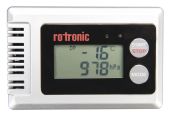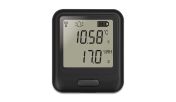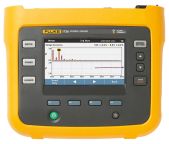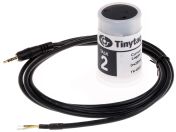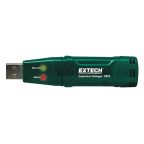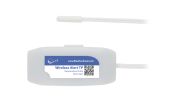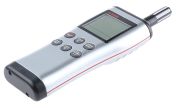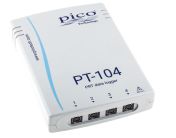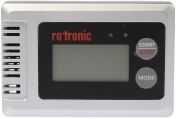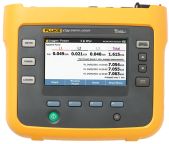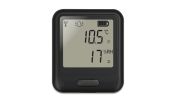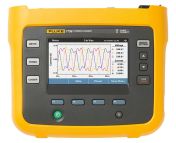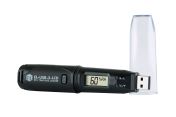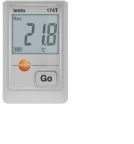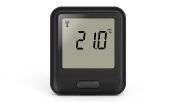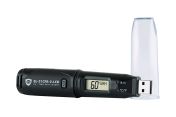Data Loggers
A data logger is a compact, battery-powered device equipped with an internal microprocessor, data storage, and one or more sensors. These devices can be deployed in various environments to automatically monitor and record measurements at set intervals. By capturing environmental parameters over time, data loggers allow users to measure, document, analyse, and validate conditions effectively. The information collected by the sensors is stored within the device and can later be transferred to a computer for detailed analysis. Discover more in our comprehensive data loggers guide.
What Does a Data Logger Do?
A data logger automatically monitors and records physical or electrical parameters over time. Depending on the specific model, measurements can include:
Environmental Parameters
- Air temperature
- Humidity
- Light intensity
- Water temperature
- Water level
- Soil moisture
- Rainfall
- Wind speed and direction
Electrical Parameters
- AC/DC current and voltage
- Differential pressure
- Time-of-use (lights, motors, etc.)
- Pulse signals
Other Variables
- Room occupancy
- Plug load
This wide range of capabilities gives data loggers reliable utility in various fields, from environmental monitoring to industrial applications.
Key Features of Data Loggers
Data loggers come with various features depending on their specific application and the type of data they are designed to collect. However, here are some key features to note when selecting a data logger:
- Compact and Portable: Data loggers are designed to be lightweight and easy to transport, making them suitable for both fieldwork and laboratory settings.
- Automated Data Measurement: These devices can measure and record data automatically under computer control, eliminating the need for continuous manual monitoring and saving valuable time and resources.
- Convenient Data Transfer: Many data loggers offer USB or wireless Bluetooth connectivity for easy and convenient data transfer to a computer or other devices for analysis.
- Remote Access and Storage: Advanced models often allow remote access, enabling users to monitor readings and store data for later analysis, even from distant locations.
- Environmental Protection: Some data loggers have an IP (Ingress Protection) rating, indicating their resistance to dust and moisture, making them suitable for use in challenging environments.
- Continuous Monitoring: Data loggers can collect data continuously, 24 hours a day, 7 days a week, providing a comprehensive record of the measured parameters over time.
- Data Visualisation and Alerts: Many modern data loggers operate on software that allow users to visualise data trends and set alerts for when readings exceed predefined thresholds.
Types of Data Loggers
Data loggers come in various types, each designed for specific applications. Here are some common types:
Temperature Data Loggers: Temperature data loggers use thermocouples or thermistors to measure temperature, and are ideal for fields in food safety, pharmaceuticals, and environmental monitoring.
Humidity Data Loggers: Humidity-type data loggers, commonly used in HVAC systems, museums, and agricultural applications, track moisture levels in the air.
Voltage and Current Data **Loggers: **These data loggers monitor electrical parameters, and are essential for energy management, motor performance analysis, and load monitoring.
Multi-Channel Data **Loggers: **Multi-channel data loggers are capable of reading data from various input types simultaneously (e.g., temperature and humidity), providing versatility for complex monitoring tasks.
Data Logger Input Types
The input of a data logger refers to the type of signal it can accept from various sensors or devices. Different data loggers are designed to handle specific input types, and some can accept multiple types for versatility. The most common types of inputs are:
- Voltage: Voltage data loggers record electrical potential differences, commonly used for monitoring battery levels, power supplies, and sensor outputs.
- Current: Current data loggers measure the flow of electrical current, often used for monitoring energy consumption, motor performance, and load analysis.
- Temperature: Temperate data loggers measure temperature using various sensor types like thermocouples, RTDs, or thermistors.
- Humidity: Humidity data loggers track the amount of moisture in the air, which is commonly used in environmental monitoring, HVAC systems, and agriculture.
- Digital: Digital data loggers accept digital signals (on/off) from switches, sensors, or other devices, often used for event logging and status monitoring.
Applications of Data Loggers
Data loggers find applications in a wide range of fields, including:
- Environmental Monitoring: Used extensively in environmental studies to track temperature, humidity, air quality, and light levels in various settings such as research projects and agriculture.
- Industrial Processes: Voltage and current data loggers, such as 3-phase voltage data loggers, help with monitoring and optimising, e.g. pressure, flow rate, voltage, and current.
- Energy Management: Data loggers help track electricity consumption, solar panel performance, and environmental conditions.
- Research and Development: Data loggers assist in areas such as biology, chemistry, physics, and engineering, supporting evidence-based discoveries and innovations.
Frequently Asked Questions About Data Loggers
How Are Data Loggers Used?
The specific steps for using a data logger may vary depending on the brand and interface type. It is always best to follow the manufacturer’s instructions. However, here are the general steps involved:
- Download and install any necessary software on your mobile device or laptop.
- Connect the data logger to your computer and configure the desired parameters, such as sampling rate and logging duration.
- Place the data logger in the desired location and record data for the desired time.
- After the logging period is complete, reconnect the data logger to your computer or mobile device.
- Download the recorded data file and analyse it using the provided software.
What Is the Recording Duration of a Data Logger?
The recording duration of a data logger depends on several factors including its battery capacity, memory size, sampling rate, and operational mode. Some data loggers can record for a few hours, while others can operate for months or even years. The sampling rate, which determines how often data is recorded, also influences the overall recording time.
How Do You Retrieve Data from a Data Logger?
Data retrieval from a data logger typically involves connecting it to a computer or mobile device via USB or wirelessly. The recorded data is then downloaded and can be viewed, analysed, and exported using compatible software. Some electronic data loggers also offer remote data access, allowing users to retrieve data without physically accessing the device.
Can Data Loggers Be Used Outdoors?
Yes, many data loggers are designed for outdoor use and come with IP ratings that indicate their resistance to dust and moisture. Always check the specifications to ensure that the data logger you are using is suitable for outdoor conditions.
How Often Should I Calibrate My Data Logger?
Calibration frequency depends on usage and manufacturer recommendations. It is generally advisable to calibrate your data logger once before a critical measurement to ensure accuracy.
The Leading Supplier and Distributor of Data Loggers
RS Singapore is a trusted supplier and distributor of data loggers featuring industry-trusted brands like Lascar, Extech, our own RS Pro, and more. We offer competitive prices and reliable products from top manufacturers to ensure accurate and efficient data acquisition for various applications.
We also carry other essential test and measurement equipment, such as clamp meters and digital multimeters, to provide a comprehensive solution for your data monitoring and analysis needs.
Order your voltage and current data loggers, temperature data loggers, humidity data loggers, and other accessories online today and enjoy next-day delivery or self-collection at your local branch. For more details on our ordering process, delivery services, and delivery fees, please refer to our Ordering Page and Delivery Page.
